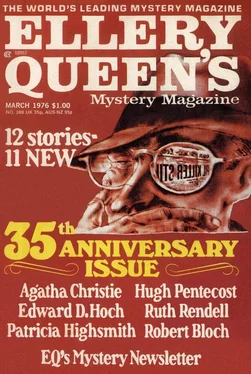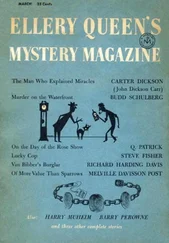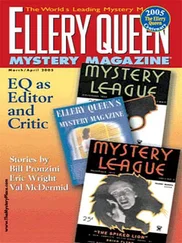Аврам Дэвидсон - Ellery Queen’s Mystery Magazine. Vol. 67, No. 3. Whole No. 388, March 1976
Здесь есть возможность читать онлайн «Аврам Дэвидсон - Ellery Queen’s Mystery Magazine. Vol. 67, No. 3. Whole No. 388, March 1976» весь текст электронной книги совершенно бесплатно (целиком полную версию без сокращений). В некоторых случаях можно слушать аудио, скачать через торрент в формате fb2 и присутствует краткое содержание. Город: New York, Год выпуска: 1976, Издательство: Davis Publications, Жанр: Детектив, на английском языке. Описание произведения, (предисловие) а так же отзывы посетителей доступны на портале библиотеки ЛибКат.
- Название:Ellery Queen’s Mystery Magazine. Vol. 67, No. 3. Whole No. 388, March 1976
- Автор:
- Издательство:Davis Publications
- Жанр:
- Год:1976
- Город:New York
- ISBN:нет данных
- Рейтинг книги:5 / 5. Голосов: 1
-
Избранное:Добавить в избранное
- Отзывы:
-
Ваша оценка:
- 100
- 1
- 2
- 3
- 4
- 5
Ellery Queen’s Mystery Magazine. Vol. 67, No. 3. Whole No. 388, March 1976: краткое содержание, описание и аннотация
Предлагаем к чтению аннотацию, описание, краткое содержание или предисловие (зависит от того, что написал сам автор книги «Ellery Queen’s Mystery Magazine. Vol. 67, No. 3. Whole No. 388, March 1976»). Если вы не нашли необходимую информацию о книге — напишите в комментариях, мы постараемся отыскать её.
Ellery Queen’s Mystery Magazine. Vol. 67, No. 3. Whole No. 388, March 1976 — читать онлайн бесплатно полную книгу (весь текст) целиком
Ниже представлен текст книги, разбитый по страницам. Система сохранения места последней прочитанной страницы, позволяет с удобством читать онлайн бесплатно книгу «Ellery Queen’s Mystery Magazine. Vol. 67, No. 3. Whole No. 388, March 1976», без необходимости каждый раз заново искать на чём Вы остановились. Поставьте закладку, и сможете в любой момент перейти на страницу, на которой закончили чтение.
Интервал:
Закладка:
“Stranger things have happened. They used an ax on Trotsky.”
“I assume you’ll search him for axes and guns,” Rand said dryly.
They pulled up before the waiting man and Rand opened the door on his side. “You British are very prompt,” Taz said as he climbed in with his attaché case.
“We try to be,” Rand answered. “This is Michael Gentres, Comrade Taz.” He didn’t introduce the driver because Gentres hadn’t mentioned his name. But the man seemed to know their destination without being told. He drove quickly through the dark streets of the city, negotiating turns with the skill of a London cabby. Rand would not have remembered the route to the safe house, but the driver apparently knew it by heart.
Presently they pulled up before the house Rand had visited earlier. There was a man on duty inside the door and he opened it as they approached. “You’ll have to be searched,” Gentres told Taz.
“Of course,” the Russian replied, obviously expecting it.
The man at the door ran his hands quickly over Taz’s body, then used a battery-operated metal detector for a more careful search. Each time it buzzed the Russian produced his keys or cigarette case and other metal objects, all of which were examined. There was also a portable x-ray unit, similiar to those used to inspect carry-on luggage at airports. The attaché case with its folder of lapel pins was passed behind the screen while they watched.
“All right,” Gentres said with a grunt, satisfied with the rows of metal emblems that appeared on the x-ray screen. “You can take the folder in, but leave the attaché case out here.”
Taz did as he was told, removing the znachki with care. “This is a great moment for me,” he said quietly. “I have admired Kolia Komarov for many years.”
The driver and the guard remained by the door, while Gentres escorted Rand and Taz into the living room. They sat waiting quietly, and after a few minutes the bearded Komarov appeared as he had done earlier in Rand’s presence. He looked around the room uncertainly, and bowed slightly to Taz.
“My znachki collection,” Taz said, speaking English so the others could understand. “You should find it quite interesting.”
Komarov accepted it and opened the folder, gazing down at the rows of little metal lapel pins. “Once I had them too,” he said, speaking with some difficulty. “Back in Moscow.”
“But not like these. Examine the backs.” Taz bent over and slipped one of the lapel pins from under the plastic cover. “See?”
Rand stepped closer to look. The microdot was in place, at the exact center of the pin’s reverse side. “Do you have viewing equipment here?” he asked Gentres.
“Certainly.”
The microdot was inserted into an optical viewer and immediately blown up to readable size. The neatly arranged pages of Kolia Komarov’s manuscript leaped into view. “Is it authentic?” Rand asked the author.
“It seems so. Yes, I remember these pages.”
Rand looked up at Taz. “And the rest?”
Taz motioned toward the collection. “There are forty-eight lapel pins. Each of them contains a microdot. Each microdot can be enlarged to show dozens of typewritten pages. I leave them to you.”
“You’re going?”
“I have been here too long already. They may be watching my hotel.”
“Wait—” Rand said, not knowing why he spoke. There was something not quite right. “Can I see you alone for a moment, Taz?”
“Certainly.”
They stepped into the next room, leaving Gentres and Komarov alone with the folder of lapel pins. Rand faced him and sighed. “Taz, my old enemy—”
“What is it?”
“The znachki is just too large for a mere forty-eight microdots. They could be carried on your passport, or in a bandage on your finger. In our business, large attracts attention, and all attention is bad. Ever since the days of the Trojan Horse we have had reason to question anything that is larger than it should be.”
“Trojan Horse?”
“You remember it, surely. Could your znachki be a Trojan Horse, Comrade Taz?”
“In what way?”
“Not a listening device, because that would have shown up on the x-ray. But something nonmetallic, like a thin layer of plastic explosive hidden in the leather binding, would pass inspection. One of the lapel pins could be the detonator, and when it was removed from the felt backing—”
Gentres interrupted with a call from the next room. “Rand, we’ve checked all the lapel pins. There are forty-eight microdots, just as he said. We’re starting to view them now.”
Taz allowed himself a slight smile. “So much for your theory, Mr. Rand. If it was correct, we would all be in pieces now.”
“I’m sorry,” Rand said simply.
“Now I really must be going. Perhaps we will see each other again someday.”
Rand followed him to the door. “They’re waiting for you outside? Is that it?”
Taz picked up his attaché case and opened it. Rand caught a glimpse of a second znachki folder, identical with the first. The driver and the guard were watching them, and Taz stepped very close so his words could not be overheard. “Understand one thing about me, Rand. I have no love for the West, no love for your system. Someday we will still bury you. But I am a proud old man, and I do not come out of retirement to ply an assassin’s trade. The znachki collection you have is harmless. I changed one of the pins.”
“Then I was right?”
Taz merely smiled. “Perhaps this is one time when we both were right, my old enemy.”
He opened the door and stepped outside. The street seemed deserted, and he started off along the sidewalk. “The car can take you back,” Rand called. Taz kept walking, ignoring him.
“Follow him,” Rand told the driver. “But at a distance. I want to know if he’s picked up.”
“I have to take my orders from Major Gentres, sir.”
Rand cursed softly. “Never mind. I’ll do it myself.” He slipped on his coat and followed Taz.
Colonel Tunic was holding open the door of the car when Taz reached it. He’d walked for three blocks, and had been about to give up searching for them. “We did not want to get too close,” Tunic said. “How did it go?”
“Well.”
Vronsky sat behind the wheel of the car. “Is that all? I heard no explosion.”
“You will not hear one,” Taz said firmly. “I do not fight my wars that way. I am not the simple code clerk in that Middle Eastern embassy, ready to jump when the KGB pulls the strings.”
Colonel Tunic bit his lip. “Comrade Taz, where is the folder?”
“Right here,” Taz said, opening his attaché case.
In the front seat Vronsky yanked the pistol from his coat and fired once at Taz’s chest.
He was just an instant too late.
Rand was still a block away when the explosion shattered the night on the quiet street. His reflexes threw him to the pavement for an instant. Then he was up and running toward the flaming car.
People were rushing from the houses, and after a moment the pulsating whine of a siren could be heard in the distance. He could see it was too late to help the car’s occupants. He tried to get close, but the flames drove him back.
Presently Gentres joined him. “Was that Taz?” he asked.
Rand nodded solemnly. “Looks as if there were one or two others with him.”
“My God. That could have been us.”
“No,” Rand said. “Taz decided it wouldn’t be us.”
“You mean he turned against his own people?”
“I think it had something to do with a man’s pride in his work. I think they recruited the wrong person for this job.”
“Definitely the wrong person,” Gentres said, watching the flames.
Читать дальшеИнтервал:
Закладка:
Похожие книги на «Ellery Queen’s Mystery Magazine. Vol. 67, No. 3. Whole No. 388, March 1976»
Представляем Вашему вниманию похожие книги на «Ellery Queen’s Mystery Magazine. Vol. 67, No. 3. Whole No. 388, March 1976» списком для выбора. Мы отобрали схожую по названию и смыслу литературу в надежде предоставить читателям больше вариантов отыскать новые, интересные, ещё непрочитанные произведения.
Обсуждение, отзывы о книге «Ellery Queen’s Mystery Magazine. Vol. 67, No. 3. Whole No. 388, March 1976» и просто собственные мнения читателей. Оставьте ваши комментарии, напишите, что Вы думаете о произведении, его смысле или главных героях. Укажите что конкретно понравилось, а что нет, и почему Вы так считаете.












